Statement by His Excellency Emomali Rahmon, President of Tajikistan at the meeting of High Level Panel On Water
Dear members of the High-Level Panel,
Distinguished participants of the meeting,
I would first of all like to extend my gratitude to the Government of Hungary and to the President Janos Ader for the excellent organization of Budapest Water Summit and the High-Level Panel on Water.
This September, the High-Level Panel on Water has adopted an Action Plan, consisting of 9 priority goals and 48 objectives.
Noting the importance of an adoption of the Action Plan, I would like to express our willingness to participate in an implementation of all its priority topics and actions.
As I’ve mentioned yesterday, we have initiated the International Decade «Water for Sustainable Development», which is included in the first task of the Plan.
A Draft Resolution on this topic is for the time being in the final stage of consideration by the UN General Assembly in New York.
We do hope that this Resolution will be adopted by consensus within the next few days.
Meanwhile, if it is adopted, it will lay down a reliable and a solid platform for our enhanced cooperation and joint efforts among stakeholders to promote sustainable development goals and address other water related issues.
Other activities where Tajikistan plays an important role are associated with the establishment of partnerships and international cooperation aimed at reduction of the risks of natural disasters, mitigation of a climate change impact, promotion of access to safe drinking water and basic sanitation, improved environment, infrastructure and investment, water resources management, and, inter alia, a role of water resources in sustainable economy.
There is no doubt, all priority topics and Action Plan are extremely important, but I would particularly like to focus on its two aspects: investment and infrastructure.
These aspects are, in our opinion, the key to addressing water challenges.
This is especially important in the context of new threats and challenges, and primarily in terms of an impact of climate change and the growth of the population, causing, as it is known, on the one hand to a reduction in reserves of fresh water, on the other hand to the increased water consumption.
To a great regret, this trend has been steadily growing, increasing water scarcity at all levels and, according to the estimation of experts, it will, by 2030, become a reason to over 40% of the world’s population to experience water shortages.
It is however obvious that in such circumstances, it is necessary to ensure sustainable financing and facilitate investment growth in infrastructure projects in the water sector.
Unfortunately, financial crisis and economic turmoil of recent years undermined the efforts of countries preventing timely implementation of programs and projects aimed at water sector development.
In this context, support for initiatives to improve water sector financing, including through existing global funds like the Green Climate Fund, is essential and would be a timely.
This is critical for the least developed and developing countries.
It is estimated that from fifteen up to thirty billion US dollars of investment funded only in developing countries to improve water management, could bring doubled direct income.
Modernization of existing and creation of new infrastructure, as well as the introduction of new technologies, will certainly play a key role in providing the efficient use and preservation of water resources.
Thus, it makes a significant contribution to ensuring water security.
For example, construction of water reservoirs enables not only develop discounted and environmentally friendly electricity, but it also ensures a reliable regulation of water flow in terms of climate volatility, protection of territories and population from mudflows and floods, help mitigate the impact of drought and significantly reduce CO2 (carbon dioxide) emissions into the atmosphere.
This certifies that well-planned infrastructure project could simultaneously help to address several vital problems.
It is for this purpose, along with the improvement of legislation and institutional management framework, we have included development of water infrastructure in the program of water sector reform in Tajikistan.
Over 80% of financial resources will be allocated for the solution of this problem.
We are confident that these actions will allow the country to make a significant step forward to meet sustainable development goals.
I express a hope that the international and regional financial institutions and donor countries will support our efforts.
Ladies and Gentlemen,
In conclusion, I would like to once again express our readiness to implement the Action Plan and promote the goals and objectives of the High-Level Panel on Water at all levels.
In the meantime, it is clear that the leadership in promoting the abovementioned initiatives requires considerable financial and technical resources, as well as capacity building.
For such developing countries, as Tajikistan, an implementation of these initiatives in the current economic circumstances becomes complicated more than ever.
Meanwhile, we intend to use every available opportunity to promote the goals and objectives of the Panel and facilitate an implementation of the Action Plan and fulfill obligations under the leadership of individual plans of action.
It is our firm belief, that our development partners, will help us to implement these goals and objectives.
Thank you for attention!












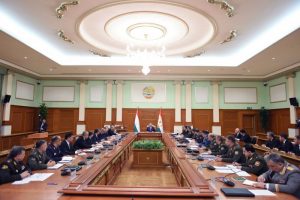 President Emomali Rahmon Holds Security Council meeting
President Emomali Rahmon Holds Security Council meeting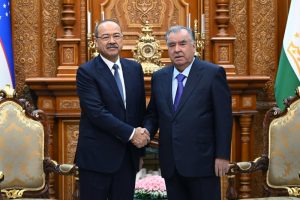 President Emomali Rahmon Receives the Prime Minister of the Republic of Uzbekistan Abdulla Aripov
President Emomali Rahmon Receives the Prime Minister of the Republic of Uzbekistan Abdulla Aripov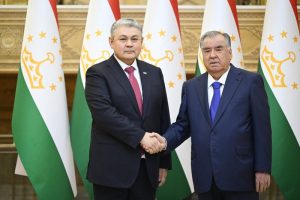 President Emomali Rahmon, Received the Minister of Foreign Affairs of the Republic of Kazakhstan
President Emomali Rahmon, Received the Minister of Foreign Affairs of the Republic of Kazakhstan President Emomali Rahmon Enacts New Laws
President Emomali Rahmon Enacts New Laws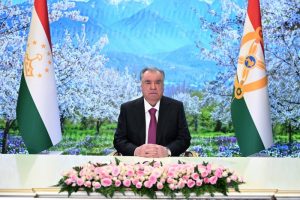 President Emomali Rahmon Sends Festive Greetings to President Xi for Chinese New Year
President Emomali Rahmon Sends Festive Greetings to President Xi for Chinese New Year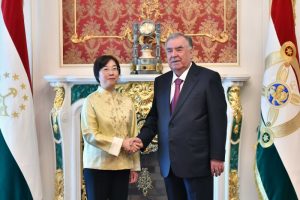 President Emomali Rahmon Receives AIIB President Zou Jiayi in Dushanbe
President Emomali Rahmon Receives AIIB President Zou Jiayi in Dushanbe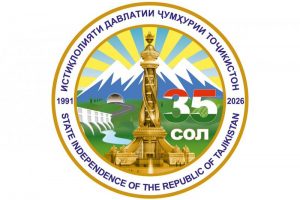 President Emomali Rahmon Approves Emblem for the 35th Anniversary of Tajikistan’s State Independence
President Emomali Rahmon Approves Emblem for the 35th Anniversary of Tajikistan’s State Independence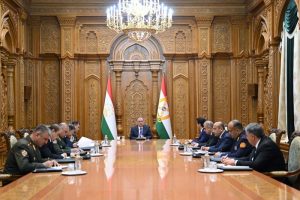 President Emomali Rahmon Holds Working Meeting with Heads of Security and Law Enforcement Agencies
President Emomali Rahmon Holds Working Meeting with Heads of Security and Law Enforcement Agencies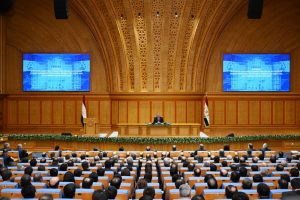 Expanded meeting of the Government of the Republic of Tajikistan
Expanded meeting of the Government of the Republic of Tajikistan














